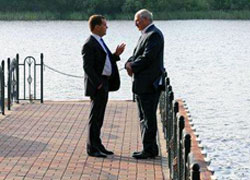Medvedev’s petroleum carrot for Lukashenka
132- 1.06.2013, 18:53
- 155,569

In return, Moscow expects the petroleum refinery and other major plants to go on sale.
During the meeting of the heads of state of the Commonwealth of Independent States (CIS) held on Friday in Minsk, Russia’s prime minister Dmitry Medvedev said that Russia is ready to remove barriers in trading with other members of the Customs union, Belarus and Kazakhstan, despite future losses that it will cause for the Russian budget.
“Our international structure demands that we refuse from the economic barriers… It is very difficult, but if we don’t want to hinder integration, it should be done even despite all the losses that our economies will suffer. We in Russia understand this and are ready to take the costs. We realize that the final result will be even better,” Medvedev commented on the Eurasian economic union that is expected to be established before January 1, 2015, within the Single economic space of Russia, Belarus and Kazakhstan.
According to Gazeta.ru, Medvedev didn’t specify what losses and costs he meant.
In Minsk, the words of the Russian prime minister were taken literally. Belarus’ expectation is that by 2015 all trade barriers will be lifted, including Russia’s refusal to charge a customs fee on the Belarusian petroleum products of Russian oil supplied outside the Customs union.
Aliaksandar Lukashenka was the first to express this position during the meeting with the CIS delegations: “We still have many withdrawals, tariff and non-tariff regulations, even within the Single economic space. I have to say that Russia has made a very serious forward and said that basically in a year and a half, not later than January 1, 2015, almost all tariff restrictions, including those in the oil and gas industry, will be lifted.”
Belarus’ vice minister of economy Anton Kudasau expressed almost the same idea at the press-conference in Minsk on Friday: “It is about Russia being prepared to eliminate all tariff and non-tariff withdrawals in the mutual trade. This is how the oil industry is regulated: export fees are not charged on crude oil, but when petroleum products of Russian oil are exported outside the Customs union, fees are charged and funneled directly to the Russian budget.”
Customs fees on the export of Russian oil to Belarus were eliminated in 2011.
In 2012, $3.8 bln of the export fees from the sales of oil and petroleum products were paid from the Belarusian to the Russian budget; in 2011, the amount was $3.1 bln.
This mechanism of mutual settlements between budgets was introduced when in 2009-2010 Russia supplied oil for Belarus’ internal consumption (6 mln ton annually with the balance of 20-21.5 mln ton) with no fees; the rest of the volume was supplied upon a standard fee on exported oil.
During the past year Belarus has seen a tremendous deterioration in the balance of trade. In the end of July 2012, supply of sublimated petroleum products from Russian raw materials labeled as “dissolvent” and “diluents” liquids from Belarus to the EU ceased. In the result, the Belarusian export to the EU and import from Russia has decreased sharply.
As a result of the increase of the trade deficit, the devaluation of the Belarusian ruble becomes unavoidable which can cause a new wave of inflation. The Belarusian powers try to avoid the crisis of 2011 when the national currency lost 300 percent of its value. They hope to recommence re-export of the Russian oil and to settle the issue with their obligations to Russia in terms of customs fees, or even to entirely eliminate the obligations.
For example, Belarus was ready to sell its surplus of industrial goods to Russia. Russia, in its turn, seems to have a different view of the mutual settlements with the Belarusian budget.
Yaraslau Ramanchuk, a Belarusian economist, reminded that “oil and petroleum products are a powerful tool in political talks. And the Kremlin is perfectly aware of the benefits for Belarus and for itself.
If one or two Belarusian oil refineries become the property of Igor Sechin (the CEO of Rosneft) and associated structures before 2015, export customs fees on petroleum products may be lifted in Belarus. Still Belarusian on the paper, the business will however work for the oil tycoons controlled by the Kremlin.”










